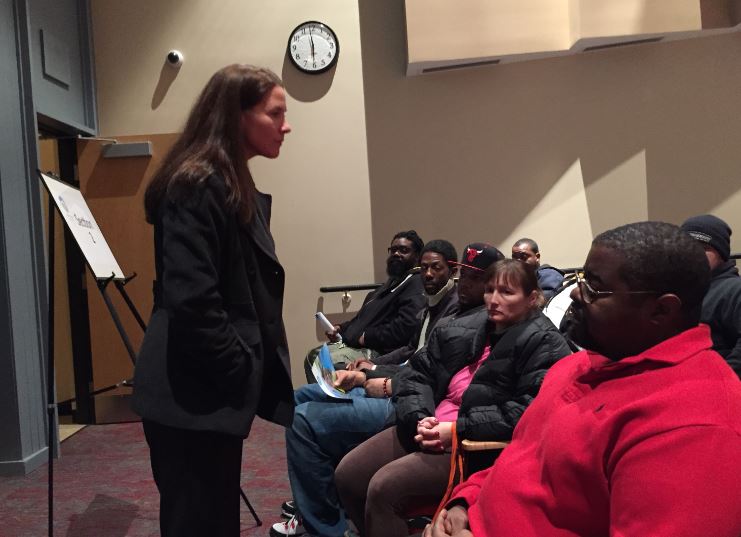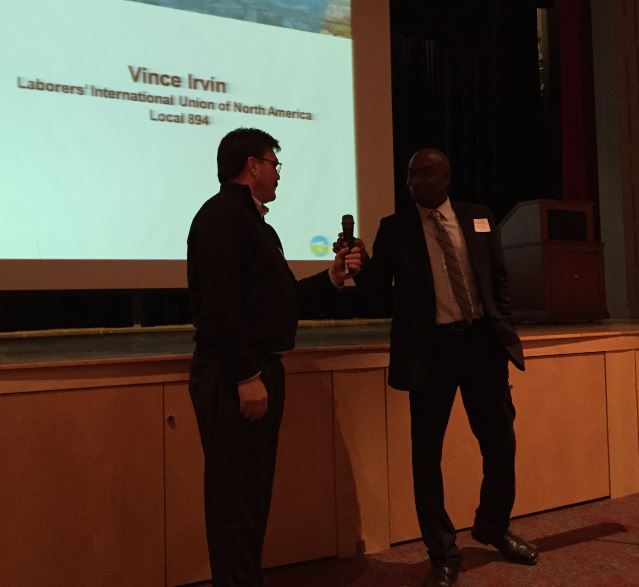Some 250 people showed up at a program on Akron’s east side that had expected to draw about half that many.
“OK, guys. I’m from the Teamsters. Who’s got questions?’
And for the better part of the next two hours, the questions -- and answers – flew.
So did the paperwork – the preliminary applications that will get some of those 250 people – and some of those who attended a session of nearly the same size a few weeks ago -- into apprenticeships with one of the skilled trade unions: Teamsters or laborers, masons or perhaps operating engineers.
 What about a record? What about a record?
Those last – the engineers -- are the men and women who maneuver the heaviest of equipment, the kind that burrows massive tunnels and carves out catch basins and other parts of the $1 billion-plus project that will keep heavy rains from forcing raw sewage into Summit County’s rivers.
Ray Matthews – an outsized man with a broad smile -- can see himself climbing aboard an outsized crane.
“Any other job I’ve ever had they always want me to do the lifting. So I want to use something to do the lifting now.”
He has another goal.
“Making some bad decisions in the past and trying to work it out now.”
Bad decisions includes a criminal record. He isn’t alone. In fact, someone in every breakout group raised the question: Does a felony record write you off?
The answer was most often no -- with a caveat, encouragement and – in the case of the masons, a bit of humor.
“If you’re escaped and you’re on the run, no we aren’t going to hire you. But if you’re a convicted felon, you’ve done your time, the rule of law and rules of society are changing as we speak today.”
Getting real
As a group, the trade unionists said their concern is someone with the right work ethic and willingness and ability to learn.
But much of the message of the night was about being realistic as well – and the union reps noted that some contractors who hire them have bigger reservations about criminal records.
They also described long days in very cold -- or hot – weather, sore knees, backs and shoulders.
Few of those attending seemed scared off by those prospects. Especially when they took in the details of the apprenticeships that start at roughly $15 an hour and nearly double at the end of four years, and include pensions, full benefits and – at least for now – lots of job security – even if Akron’s sewer project weren’t in the picture.
For some, a tinkering; for others, a life change
That’s not the case for all the trades. Christine Adams says her “significant other” is a union painter, facing a layoff. So she’s interested in returning to the workforce in masonry.
“I’ve learned some skills with my father over the years. And I have worked construction. I’ve been a riveter. I think I bring a lot to the table.”
But for others, construction work would be a drastic change.
Napoleon Rogers works with developmentally disabled people now.
“It’s a rewarding job. I love the job. It’s just the pay is not that great.”
Janiece Davis brought her 11-year-old daughter with her to the session, leaving her baby daughter at home. She has an associate’s degree in surgical assisting but not a lot of prospects in that field right now.
Trade unions participating in the jobs program:
- Tri-County Building and Construction Trades Council
- International Brotherhood of Teamsters Local 348
- Laborers' International Union of North America Local 894
- United Brotherhood of Carpenters and Joiners of America Local 285
- International Brotherhood of Electrical Workers Local 306
- Operative Plasterers' and Cement Masons' International Association Local 109
- Plumbers and Pipefitters Local 219
- International Union of Operating Engineers Local 18
|
“It is quite the opposite, but I have to do what I have to do. If I can’t find a job in one area, I spent a lot of money on college loans, things are in default. I can’t pay it. If there’s an open door, if you can get paid while you’re being trained, there’s no drawback to me.”
Phil Montgomery is Akron’s assistant service director and in charge of the project. He notes that the city’s unemployment rate has gone from more than 7 percent to less than 5 percent since the project was developed.
“We’re still seeing people who are underemployed and unemployed that want to take advantage of this. It’s just that there are people out there who want to work and it’s getting better but its not where it needs to be.”
The pre-apprenticeship applications will be screened by a team put together by the Akron Urban League and Summit County Community Action Agency, which will conduct interviews and do some “soft-skills training” before passing names onto the unions. The city’s goal is to have as many as half the workers on the sewer project made up of city residents. |